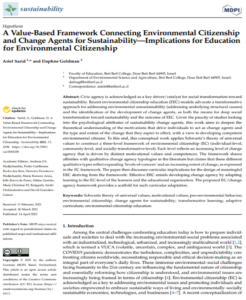A Value-Based Framework Connecting Environmental Citizenship and Change Agents for Sustainability—Implications for Education for Environmental Citizenship
Sarid, A., & Goldman, D. (2021). A Value-Based Framework Connecting Environmental Citizenship and Change Agents for Sustainability—Implications for Education for Environmental Citizenship. Sustainability, 13(8), 4338.

Abstract
Civic agency is acknowledged as a key driver/catalyst for social transformation toward sustainability. Recent environmental citizenship education (EEC) models advocate a transformative approach for addressing environmental unsustainability (addressing underlying structural causes) and the identification of the development of change agents, as both the means for deep social transformation toward sustainability and the outcome of EEC. Given the paucity of studies looking into the psychological attributes of sustainability change agents, this work aims to deepen the theoretical understanding of the motivations that drive individuals to act as change agents and the type and extent of the change that they aspire to effect, with a view to developing competent environmental citizens. To this end, this conceptual work applies Schwartz’s theory of universal values to construct a three-level framework of environmental citizenship (EC) (individual-level, community-level, and socially-transformative-level). Each level reflects an increasing level of change agency that is driven by distinct motivational values and competences. The framework shares affinities with qualitative change agency typologies in the literature but claims that these different qualitative types reflect expanding ‘levels-of-concern’ and an increasing extent of change, as expressed in the EC framework. The paper then discusses curricular implications for the design of meaningful EEC deriving from the framework: Effective EEC entails developing change agency by adapting learning to the EC-level of the learners and the educational organization. The proposed EC/change agency framework provides a scaffold for such curricular adaptation.
